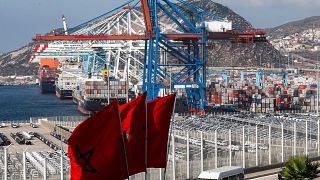Nigeria
Hundreds of heavy duty trucks have remained stuck on roads in Nigeria's economic capital Lagos, as they wait to get access into the Tin Can Island port.
The congestion, which is almost crippling operations at the Lagos TinCan port, has compelled some shipping lines to divert Nigeria-bound cargoes to neighboring ports in Cotonou and Cote D’ Ivoire according to Nigerian Ports Consultative Council.
A long-running crisis at the Apapa and Tin Can Island ports Lagos, the main commercial entry points into Africa’s largest economy Nigeria, has been worsened by the pandemic-induced economic slump.
With the then imposed lockdown and many curfews, dock labour was hampered, lowering productivity and extending the long stays of the vessels.
But some experts say the port congestion is caused by even more factors that include ageing infrastructure, meagre rail transport that forces around 90 per cent of cargo to go by road and an almost complete lack of automation.
As port congestion worsens, cost of shipping containers is reported to have risen by 600%.
Meanwhile, Nigeria reopened its border with Benin In December 2020, but heavy-goods vehicles are reportedly still not making cross-border trips.
The Africa Continental Free Trade Area agreement came into effect on January 1 but many Nigerian businesses have complained that higher costs make it hard for them to compete.
Around the world, the coronavirus pandemic has strained international supply chains and threatened to disrupt trade.











01:00
Pix of the Day, 26 February 2026
Go to video
Six people injured after fire breaks out at Lagos international airport
Go to video
Toxic gas leak at mine in Nigeria kills 37 people
Go to video
38 killed in gas blast at Nigeria lead mine
01:18
ISWAP raid kills eight Nigerian soldiers as jihadist attacks intensify in northeast
Go to video
Nigeria issues warning over illegal recruitment of its citizens for Russia’s war in Ukraine